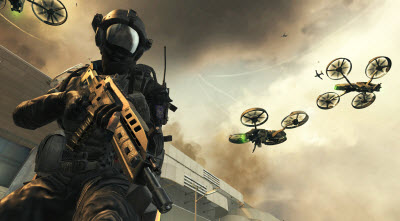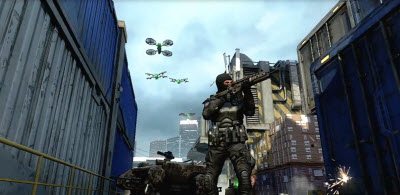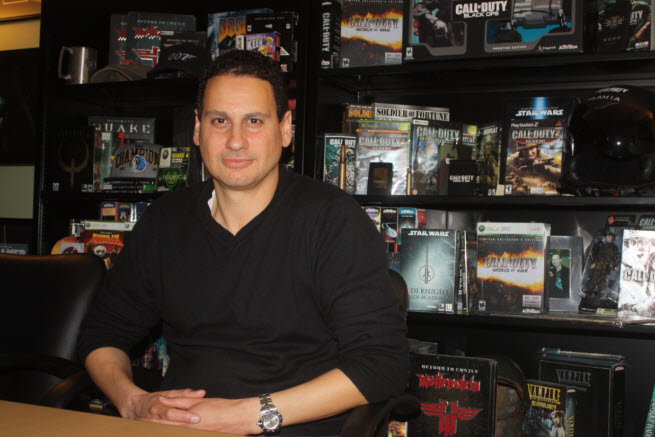Activision Blizzard is announcing today that Call of Duty: Black Ops II will be the newest installment of the fastest-selling video game franchise of all time. Once again, studio Treyarch will make this game, which has more than 250 developers (plus another 50 outside) working on the title for its fall release.
Call of Duty has generated billions of dollars in revenues since 2003, and the latest installments are generating more than $1 billion in revenues each year. While Call of Duty creators Infinity Ward have overshadowed Treyarch in the past, Treyarch has become an equal partner in producing a new Call of Duty game every other year.
The previous Black Ops title took us back to the secret operations of the 1960s. The new game will take place in both the 1980s and the year 2025. That’s a huge change for the franchise in terms of storyline and combat tactics. In the game, terrorists hijack the U.S. military’s fleet of drones and use them against major cities in the U.S. and China.
We talked with Mark Lamia, studio head of Treyarch, about this change in the setting for the game and the challenge of designing it. Here’s an edited transcript of our interview. And check out our interview with Lamia from two years ago.
 GamesBeat: How did you get started on the concepts for Call of Duty: Black Ops II?
GamesBeat: How did you get started on the concepts for Call of Duty: Black Ops II?
Mark Lamia: It came toward the very end of Black Ops. I think it was around submission. Dave Anthony [game design director at Treyarch] and screenwriter David Goyer had a conversation about working together. We wanted to create a sequel. What would that be? Dave [Anthony] has made quite a few Call of Dutys, and this time he really wanted to rewrite the rules of storytelling. We talked about doing this generation-spanning Call of Duty: Black Ops.
While the first one took place mostly during the Cold War, there was one level in that post-World War II era. As part of our fiction, we don’t focus on a time frame. It’s all about black ops. That really allows us to take on whatever fiction we want to tell. So in this case it was — we knew we wanted to introduce new gameplay. And we felt like that near-future setting would provide some really good fertile ground for us to create new gameplay with new weaponry and new technology available at the time.
That’s where that all started. It started on the story front but also from the gameplay perspective, looking at it on both sides. I think it’s really important, especially since you can’t just think about the campaign. You have to think about multiplayer. We wanted to introduce new gameplay there. Having some of the new technology would allow some of the new gameplay. And if you look at what the campaigns in the past — they have really introduced a lot of new gameplay that you can experience. I say you “can” experience it because you don’t have to, like in the Strike Force missions. You could just play that with a gun in your hand. You don’t have to take over any of the tools of the battlefield, like the drones or commanders. But you’d be missing a lot of the fun if that’s all you did.
GamesBeat: How long ago did you also decide to go down different fictional lines between Treyarch and Infinity Ward? This seems like the story almost means that you’re on a completely separate story arc than Modern Warfare.
Lamia: Yeah, the two timelines have never intersected. They’re in the same franchise, but they’re different fictions inside the same franchise.
GamesBeat: I didn’t really realize that with the first Black Ops.
Lamia: Oh, really?
 GamesBeat: I thought that Black Ops is the ’60s, Modern Warfare is in the present time, but they all could be in the same timeline. And so if your story is now moving to 2025, that creates a problem. If you visit New York in your story, and it is still standing, then that means that the city wasn’t destroyed in Modern Warfare 3. But that’s never been the way you guys have thought about it?
GamesBeat: I thought that Black Ops is the ’60s, Modern Warfare is in the present time, but they all could be in the same timeline. And so if your story is now moving to 2025, that creates a problem. If you visit New York in your story, and it is still standing, then that means that the city wasn’t destroyed in Modern Warfare 3. But that’s never been the way you guys have thought about it?
Lamia: No, no, actually. Like I said, when we think about the fictions, we actually created a historical fiction for Black Ops that assumed we were where we were — that these were the black ops. If you remember, our story was that everything you know about history is wrong. Those are the secret wars — the deniable operations you didn’t know about.
That’s the case as we’re crafting the ’80s as well. So when you experience those conflicts in the ’80s, some of those conflicts that you have heard about might be different. They’ll set you in that historical setting, but we’ll weave our fiction right into it. There will be a lot of interesting surprises for the player in the story much like there was with the original Black Ops. That was really interesting. One of the new interesting challenges for us is we don’t know what the future holds, so we actually had to create it. We knew that we wanted it to feel very rooted in fact if someone were to research it. This is a very well-researched and thought-through fiction for a future story. We’re creating that second Cold War.

